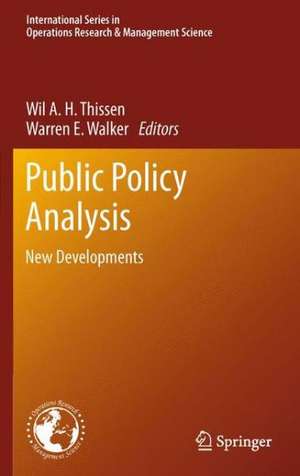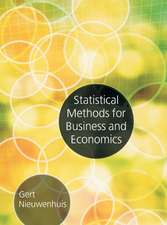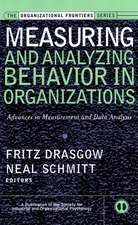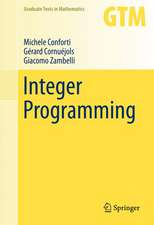Public Policy Analysis: New Developments: International Series in Operations Research & Management Science, cartea 179
Editat de Wil A. H. Thissen, Warren E. Walkeren Limba Engleză Paperback – 9 noi 2014
Public Policy Analysis: New Developments acknowledges the variety of approaches and provides a synthesis of the traditional and new approaches to policy analysis. It provides an overview and typology of different types of policy analytic activities, characterizing them according to differences in character and leading values, and linking them to a variety of theoretical notions on policymaking. Thereby, it provides assistance to both end users and analysts in choosing an appropriate approach given a specific policy situation. By broadening the traditional approach and methods to include the analysis of actors and actor networks related to the policy issue at hand, it deepens the state of the art in certain areas. While the main focus of the book is on the cognitive dimensions of policy analysis, it also links the policy analysis process to the policymaking process, showing how to identify and involve all relevant stakeholders in the process, and how to create favorable conditions for use of the results of policy analytic efforts by the policy actors.
The book has as its major objective to describe the state-of-the-art and the latest developments in ex-ante policyanalysis. It is divided into two parts. Part I explores and structures policy analysis developments, the development and description of approaches to diagnose policy situations, design policy analytic efforts, and policy process conditions. Part II focuses on recent developments regarding models and modeling for policy analysis, placing modeling approaches in the context of the variety of conditions and approaches elaborated in Part I.
| Toate formatele și edițiile | Preț | Express |
|---|---|---|
| Paperback (1) | 640.55 lei 6-8 săpt. | |
| Springer Us – 9 noi 2014 | 640.55 lei 6-8 săpt. | |
| Hardback (1) | 644.95 lei 6-8 săpt. | |
| Springer Us – 5 oct 2012 | 644.95 lei 6-8 săpt. |
Din seria International Series in Operations Research & Management Science
- 20%
 Preț: 331.25 lei
Preț: 331.25 lei - 9%
 Preț: 696.06 lei
Preț: 696.06 lei - 20%
 Preț: 570.62 lei
Preț: 570.62 lei - 18%
 Preț: 1132.02 lei
Preț: 1132.02 lei - 18%
 Preț: 773.72 lei
Preț: 773.72 lei -
 Preț: 170.40 lei
Preț: 170.40 lei - 17%
 Preț: 459.35 lei
Preț: 459.35 lei - 17%
 Preț: 360.48 lei
Preț: 360.48 lei -
 Preț: 263.40 lei
Preț: 263.40 lei - 24%
 Preț: 905.31 lei
Preț: 905.31 lei - 17%
 Preț: 460.09 lei
Preț: 460.09 lei - 17%
 Preț: 459.35 lei
Preț: 459.35 lei - 20%
 Preț: 631.58 lei
Preț: 631.58 lei - 13%
 Preț: 480.01 lei
Preț: 480.01 lei - 18%
 Preț: 738.28 lei
Preț: 738.28 lei - 18%
 Preț: 1225.94 lei
Preț: 1225.94 lei - 18%
 Preț: 948.92 lei
Preț: 948.92 lei - 18%
 Preț: 703.88 lei
Preț: 703.88 lei - 18%
 Preț: 957.44 lei
Preț: 957.44 lei - 15%
 Preț: 651.84 lei
Preț: 651.84 lei - 20%
 Preț: 336.21 lei
Preț: 336.21 lei - 15%
 Preț: 641.03 lei
Preț: 641.03 lei -
 Preț: 404.29 lei
Preț: 404.29 lei - 18%
 Preț: 950.21 lei
Preț: 950.21 lei - 15%
 Preț: 649.06 lei
Preț: 649.06 lei - 18%
 Preț: 725.75 lei
Preț: 725.75 lei -
 Preț: 394.12 lei
Preț: 394.12 lei - 18%
 Preț: 951.47 lei
Preț: 951.47 lei - 15%
 Preț: 639.59 lei
Preț: 639.59 lei - 18%
 Preț: 773.06 lei
Preț: 773.06 lei - 18%
 Preț: 889.29 lei
Preț: 889.29 lei - 15%
 Preț: 655.60 lei
Preț: 655.60 lei - 15%
 Preț: 640.06 lei
Preț: 640.06 lei
Preț: 640.55 lei
Preț vechi: 753.60 lei
-15% Nou
Puncte Express: 961
Preț estimativ în valută:
122.57€ • 131.07$ • 102.20£
122.57€ • 131.07$ • 102.20£
Carte tipărită la comandă
Livrare economică 17 aprilie-01 mai
Preluare comenzi: 021 569.72.76
Specificații
ISBN-13: 9781489973511
ISBN-10: 1489973516
Pagini: 296
Ilustrații: X, 286 p.
Dimensiuni: 155 x 235 x 16 mm
Greutate: 0.42 kg
Ediția:2013
Editura: Springer Us
Colecția Springer
Seria International Series in Operations Research & Management Science
Locul publicării:New York, NY, United States
ISBN-10: 1489973516
Pagini: 296
Ilustrații: X, 286 p.
Dimensiuni: 155 x 235 x 16 mm
Greutate: 0.42 kg
Ediția:2013
Editura: Springer Us
Colecția Springer
Seria International Series in Operations Research & Management Science
Locul publicării:New York, NY, United States
Public țintă
ResearchCuprins
Introduction.- A Policy Sciences View on Policy Analysis.- Perspectives on Policy Analysis: A Framework for Understanding and Design.- Diagnosing Policy Problems and Situations.- Designing the Policy Analysis Process.- Organizing the Policy Analysis Process.- System Models for Policy Analysis.- Actor Models for Policy Analysis.- Uncertainty in the Framework of Policy Analysis.
Recenzii
From the reviews:
“Thissen, Walker, and their colleagues aim to present a way of incorporating rational analysis in political policy and decision making, where power play is common. … this book is a welcome addition to the literature. OR/MS practitioners working in the private sector might learn something by reading it; those working in public policy will certainly do so, as will students.” (Michael Pidd, Interfaces, Vol. 44 (1), January-February, 2014)
“Thissen, Walker, and their colleagues aim to present a way of incorporating rational analysis in political policy and decision making, where power play is common. … this book is a welcome addition to the literature. OR/MS practitioners working in the private sector might learn something by reading it; those working in public policy will certainly do so, as will students.” (Michael Pidd, Interfaces, Vol. 44 (1), January-February, 2014)
Textul de pe ultima copertă
Traditional policy analysis approaches are characterized by a focus on system modeling and choosing among policy alternatives. While successful in many cases, this approach has been increasingly criticized for being technocratic and ignoring the behavioral and political dimensions of most policy processes. In recent decades, increased awareness of the multi-actor, multiple perspective, and poly-centric character of many policy processes has led to the development of a variety of different perspectives on the styles and roles of policy analysis, and to new analytical tools and approaches – for example, argumentative approaches, participative policy analysis, and negotiation support. As a result, the field has become multi-faceted and somewhat fragmented.
Public Policy Analysis: New Developments acknowledges the variety of approaches and provides a synthesis of the traditional and new approaches to policy analysis. It provides an overview and typology of different types of policy analytic activities, characterizing them according to differences in character and leading values, and linking them to a variety of theoretical notions on policymaking. Thereby, it provides assistance to both end users and analysts in choosing an appropriate approach given a specific policy situation. By broadening the traditional approach and methods to include the analysis of actors and actor networks related to the policy issue at hand, it deepens the state of the art in certain areas. While the main focus of the book is on the cognitive dimensions of policy analysis, it also links the policy analysis process to the policymaking process, showing how to identify and involve all relevant stakeholders in the process, and how to create favorable conditions for use of the results of policy analytic efforts by the policy actors.
Public Policy Analysis: New Developments acknowledges the variety of approaches and provides a synthesis of the traditional and new approaches to policy analysis. It provides an overview and typology of different types of policy analytic activities, characterizing them according to differences in character and leading values, and linking them to a variety of theoretical notions on policymaking. Thereby, it provides assistance to both end users and analysts in choosing an appropriate approach given a specific policy situation. By broadening the traditional approach and methods to include the analysis of actors and actor networks related to the policy issue at hand, it deepens the state of the art in certain areas. While the main focus of the book is on the cognitive dimensions of policy analysis, it also links the policy analysis process to the policymaking process, showing how to identify and involve all relevant stakeholders in the process, and how to create favorable conditions for use of the results of policy analytic efforts by the policy actors.
Caracteristici
Provides a first synthesis of the traditional and new approaches to policy analysis Links the policy analysis process to the policy making process, showing how to identify and involve all relevant stakeholders in the process Includes realistic examples and practical guidelines that should help readers understand what policy analysis is and how it may be of assistance to them Includes supplementary material: sn.pub/extras












